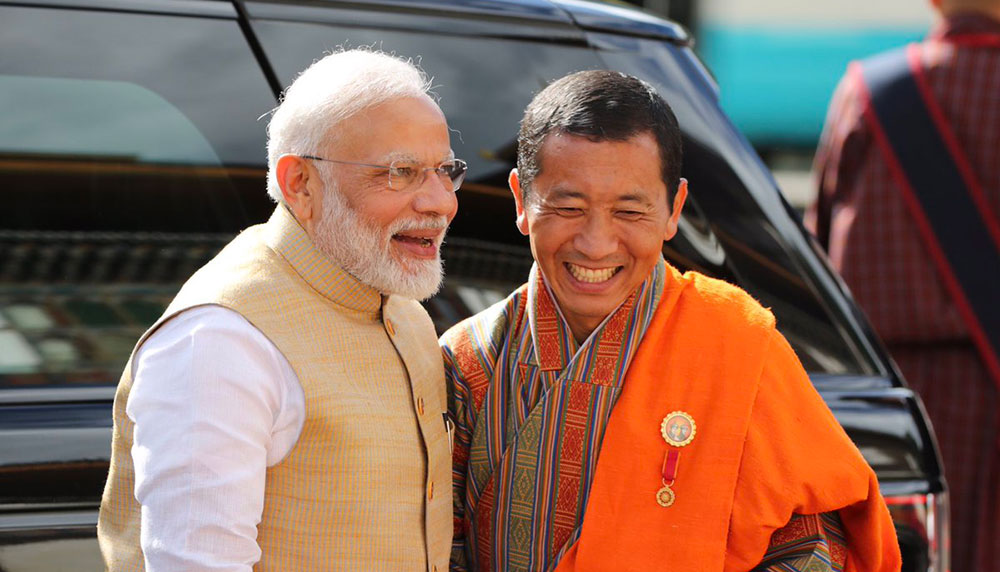It is a truism that connectivity brings nations and people closer together, enhancing equality, providing opportunities of social mobility, leading to dynamic and vibrant societies and economies. Linkages between institutions, digital links, modes of transport, infrastructure, energy, education and research, human resources development, tourism and cultural exchanges are some of the practical manifestations. The World Bank is on record that enhanced connectivity leads to higher economic growth for societies, more so, for the bottom 40% of the income distribution.
Sabka Saath, Sabka Vikaas (collective action, inclusive growth) is not only limited to domestic policies but is a central pillar of India’s relations with Bhutan. On being conferred the Order of the Druk Gyalpo by His Majesty the King of Bhutan last year, Prime Minister Modi had remarked that India would always cherish Bhutan as one of its closest friends and neighbours and that India would continue to support Bhutan’s development journey in every possible way.
In this vein, and diversifying away from the traditional pillars of development assistance and hydropower, India has strengthened its connectivity with Bhutan into new areas, through an enhanced digital footprint via space technologies and high-speed internet.
As one significant example, a peering arrangement between India’s National Knowledge Network and Bhutan’s Druk Research and Education Network was established speedily in the footsteps of Prime Minister Narendra Modi’s address at the 2014 SAARC Summit.
In follow up, a 1 GBPS link was inaugurated by Prime Minister Modi in the course of his State Visit to Bhutan in August 2019. Since its inception, the link has been benefiting schools, hospitals and academic institutions in Bhutan by providing high-speed and reliable internet connectivity, an information highway between educational communities worldwide, and facilitating unhindered access to research and educational content hosted by the National Knowledge Network.
In view of the ‘success’ of this ‘arrangement’ and based on Bhutan’s request, the Government of India has recently increased the bandwidth for the NKNDrukREN link to 5 GBPS.
The benefits of additional bandwidth are evident. The NKN-DrukREN link supports effective distance education by enabling virtual classrooms. It equips Bhutan’s hospital to provide telemedicine services through remote diagnosis and treatment of patients. Additional bandwidth will also increase access of Bhutanese youth to global research and educational content, as NKN is connected to 7 global RENs- Geant (Europe), SingAREN, Internet2, Asi@Connect, CERN, LEARN and NORDUnet. Critically, the link provides internet redundancy to the schools, institutions and hospitals in Bhutan in case of failure of the commercial internet.
This additional bandwidth is indeed a timely step, which will complement Bhutan’s efforts to transform itself into a digitally connected and inclusive society under its ‘Digital Drukyul’ flagship.
The Government of India is also pleased to consider a Third International Internet Gateway, which, when operational, will give a fillip to IT and IT-enabled services in Bhutan, in line with His Majesty’s vision to harness technology for Bhutan’s national growth. This will allow Bhutan to enjoy high-speed internet redundancy through an alternative link to the Siliguri corridor, augmenting Bhutan’s digital security at a rate that is affordable for the Royal Government of Bhutan. It is hoped that the Third Internet Gateway will also aid Bhutan’s post-pandemic economic recovery in a manner that will be both resilient and sustainable.
In 2017, Prime Minister Modi had launched the South Asia Satellite as a gift to the countries of the South Asia region including Bhutan. In August 2019, Prime Minister Lyonchhen Dr Lotay Tshering and Prime Minister Modi had jointly inaugurated the Ground Earth Station of the South Asia Satellite in Thimphu, which was constructed with the support of the Indian Space Research Organisation. Recognizing the positive impact that the satellite would have on the socio-economic development of Bhutan in areas such as communication and disaster management, the Prime Minister of India had also increased the bandwidth on an additional transponder per Bhutan’s requirements, as a gift to the people of Bhutan.
Some of the remotest corners of Bhutan which had no access to television and depended mainly on radio and local leaders for information are now connected with the outside world, following the success of the South Asia Satellite. According to the Department of Local Government, there were 39,461 households in rural Bhutan without BBS connectivity. In 2020, the Royal Government began installing Ku-band dishes through the South Asia Satellite. The result is that over 11,000 remote and rural households now have access to BBS, particularly BBS Channel 3 which focuses on high-quality educational content.
We are also delighted that BBS Channel 3 has been installed in Bhutan on the back of the South Asia Satellite Ground Earth Station through Alpha Design Technology Limited, an Indian company based in Bengaluru, and the Indian Space Research Organisation. The new channel is being used to broadcast excellent educational content for the children and youth of Bhutan in HD format. Given Bhutan’s experience with lockdowns and closures of schools, the launch of BBS Channel 3 is indeed a transformative step, in line with the Royal Kasho to transform education within Bhutan.
Connectivity- now a key pillar of the India-Bhutan relationship- supports economic growth and enhances resilience in the event of disruptions, such as the Covid-19 pandemic. Most important, India-Bhutan connectivity projects are conceptualized keeping in mind the philosophy of Gross National Happiness, espoused by His Majesty the Fourth King of Bhutan.
As Prime Minister Modi had said in his address at the Royal University of Bhutan: “No other two countries in the world understand each other so well or share so much. And no two countries are such natural partners in bringing prosperity to their peoples.” It is this spirit of progress and advancement that continues to be the mainstay of the India-Bhutan friendship.
Contributed by
Ambassador Ruchira Kamboj
Thimphu


